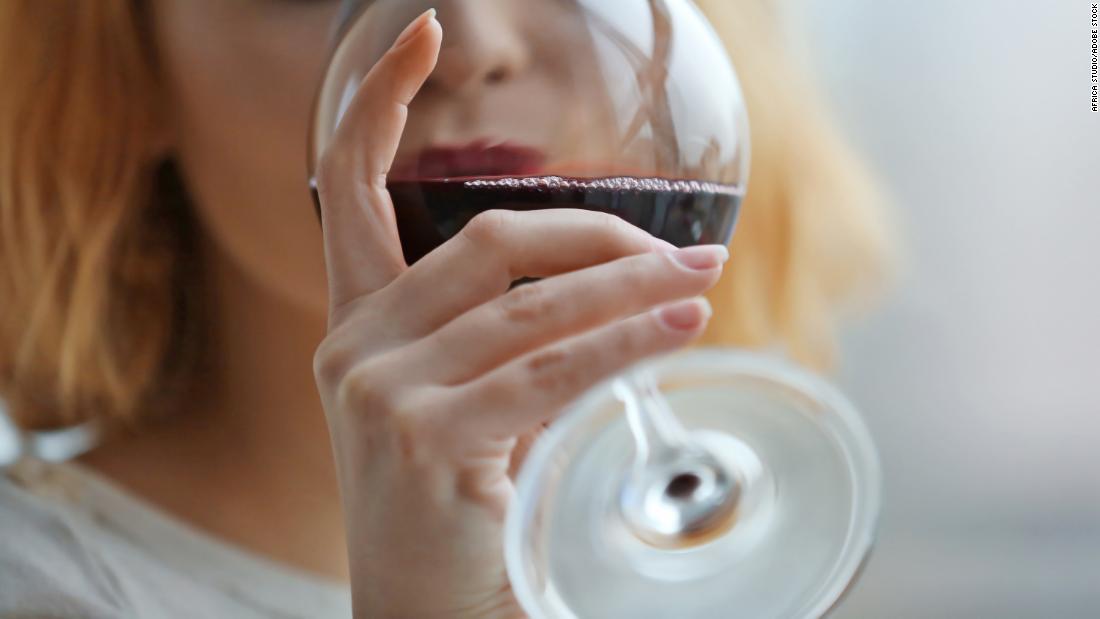Study debunks myths about the benefits of alcohol 1:22
(CNN) --
For many people, social drinking is a celebrated pastime.
At least it was in the old days, you know, before we started living through the covid-19 nightmare version of Bill Murray's "Groundhog Day."
During the repetitive grind of the pandemic, enjoying an occasional glass of wine with the girls has been replaced by Zoom wine hour, or worse, drinking in solitary confinement.
No amount of alcohol benefits the heart, new report reveals, but critics dispute this conclusion
"The data we have shows that alcohol consumption has definitely increased since the start of the pandemic — about a 14% increase in the number of days of alcohol consumption per month," said Dr. Sarah Wakeman, chief medical officer. of the Substance Use Disorders Initiative at Massachusetts General Hospital.
For women, the numbers are even higher, Wakeman said.
"In fact, there has been a 41% increase in binge drinking days among women since the start of the pandemic."
Why did women start drinking more than men?
advertising
"Studies have shown that the complexities of balancing home, work and caregiving responsibilities during the pandemic have fallen disproportionately on women," said Dr. Leena Mittal, chief of the women's mental health division. in the department of psychiatry at Brigham and Women's Hospital in Boston.
"There's also a lot of marketing of new alcohol products targeting women and especially moms," Mittal said, at a time when everyone is watching a lot more television.
Add to that the "mom wine culture that normalized and in some ways even glorified" alcohol before the pandemic, and the line between social drinking and risky drinking can quickly "become blurred," he said.
A story of lost borders
USA: Pandemic affects the mental health of minorities the most 1:09
The pandemic has also blurred the lines between home and work for many women.
Mittal tells the story of one of her patients who walked home from work in the days before the pandemic.
"I would take a 30- or 45-minute walk that served as exercise, as alone time, as stress relief," Mittal said.
"She was able to transition from work to home responsibilities and, in the end, she was like a buffer."
But since the pandemic, those lines have blurred.
In an effort to create a sense of space for herself and her mother who lived with her, Mittal's patient began to turn to alcohol.
"After her children went to bed, she would have a glass or two of wine with her mother. Sometimes it was tea, but often it was wine and it quickly became more than what they had been drinking in the past," Mittal said.
"And I think this is a very common story."
Coping with the pandemic is even more difficult for those who were already struggling with alcohol and substance abuse before it began, experts stress.
"It's like the entire society is on fire, including those who have known mental health and substance use disorders," Mittal said.
health hazards
Adamari López highlights the importance of checking the breasts 1:59
A higher level of alcohol consumption in women is concerning, Wakeman said, because of the link between alcohol and breast cancer risk.
"Any amount of drinking increases the risk of breast cancer, and that's a unique risk among women," Wakeman said.
"There really is no safe level of alcohol consumption when it comes to breast cancer."
There are many more consequences to drinking too much, both for women and men.
Accidents and injuries are associated with the consumption of alcohol, even in moderate amounts.
Domestic violence is often fueled by alcohol, as is child abuse.
It also plays a role in countless health problems.
Why everyday things like getting out of bed, bathing and eating can be a struggle for people with depression
"Alcohol use could have health-related consequences in addition to addiction," Wakeman said.
"Like high blood pressure, acid reflux, liver disease and liver injury, which is something we're seeing a huge increase in, particularly among younger people and women in a way that we've never seen before."
Not to mention the cost of mental health, including depression, anxiety, and more.
"Several studies have shown that increased alcohol consumption in the pandemic has been associated with increased mental health symptoms, even in people who had no prior diagnoses or prior mental health needs," Mittal said.
See here the help contacts in several countries to face depression.
Have you crossed the line?
Why did addictions increase during the pandemic?
4:39
Man or woman, how do you know if your drinking has crossed over to the dark side?
One telltale sign is when the drink begins to interfere with your ability to go about your daily life, experts say.
"Alcohol use disorder is defined as the compulsive use of alcohol despite having negative consequences of its use, such as an impact on your relationships, your ability to function in your job or in any role you have in your community," Wakeman explained.
Another sign: you continue to drink despite its negative impact on your physical or mental health.
"It can also be not feeling well or having a hard time getting up in the morning," Mittal said.
"And don't forget about relationships. Do you have more disagreements? Are people in your life expressing concern or noticing that you're different? Hiding your drinking, or lying about it, are also concerning behaviors."
Here's a red flag: You're pouring great drinks without realizing it.
Current American Heart Association guidelines call for no more than two standard drinks a day for men and one for women and anyone over the age of 65.
But what is a standard drink?
"That's 12 ounces of regular beer, four ounces of regular wine, or an ounce and a half of liquor if you're drinking spirits," Wakeman said.
"However, people can be pouring themselves a large glass of wine and not realize that it's actually two or three servings of wine and not just one."
"We know that millions of Americans drink above those levels, even in pre-pandemic times," he added.
"In 2019, about 66 million Americans had episodes in which they drank more than the recommended limits."
If you (or a loved one) seem to be struggling with alcohol, don't hesitate to seek help, experts stress.
There are many different support groups that can help, such as 12-step programs and individual therapy.
If you find yourself without a real red flag, but want to cut back for your overall well-being, Mittal suggests doing so with compassion.
"We are all experiencing unprecedented stress and trauma. Everyone has limits, and we are all being pushed beyond our limits right now. Self-compassion is really important in all of this," she said.
"I always worry that people will feel like they've done something wrong if they drink more than is good for them," he added.
"It's not a moral failing. If you see signs that things aren't going as well as they should, give yourself a little grace and focus on self-care instead of drinking."
Alcoholcoronavirus









